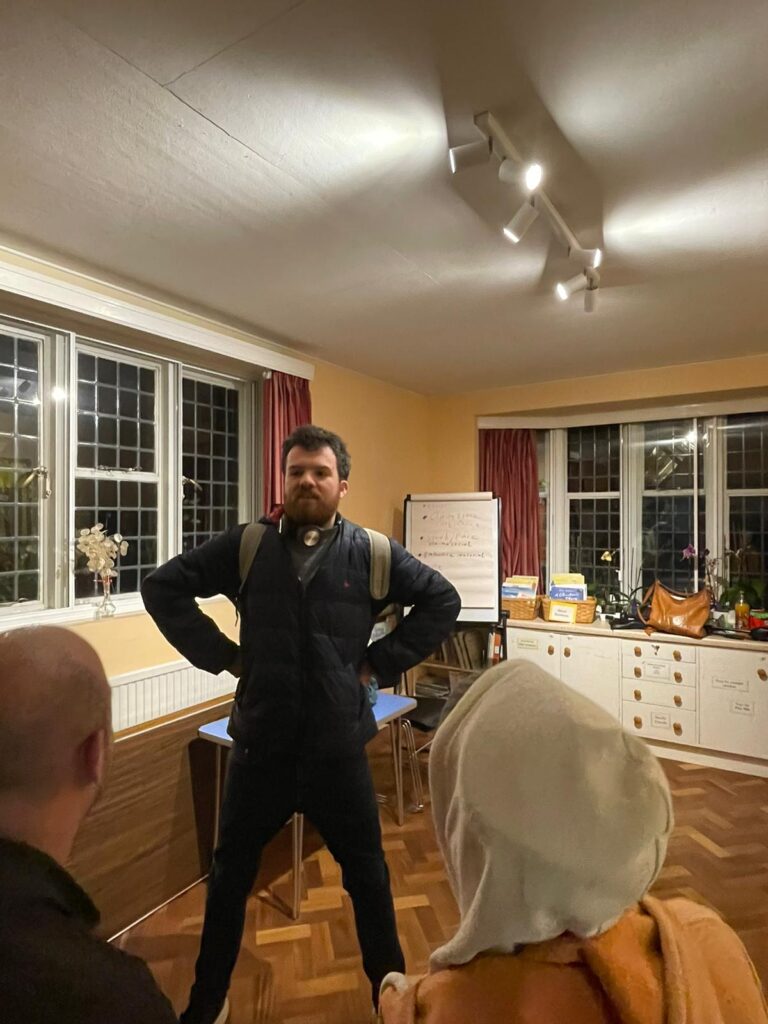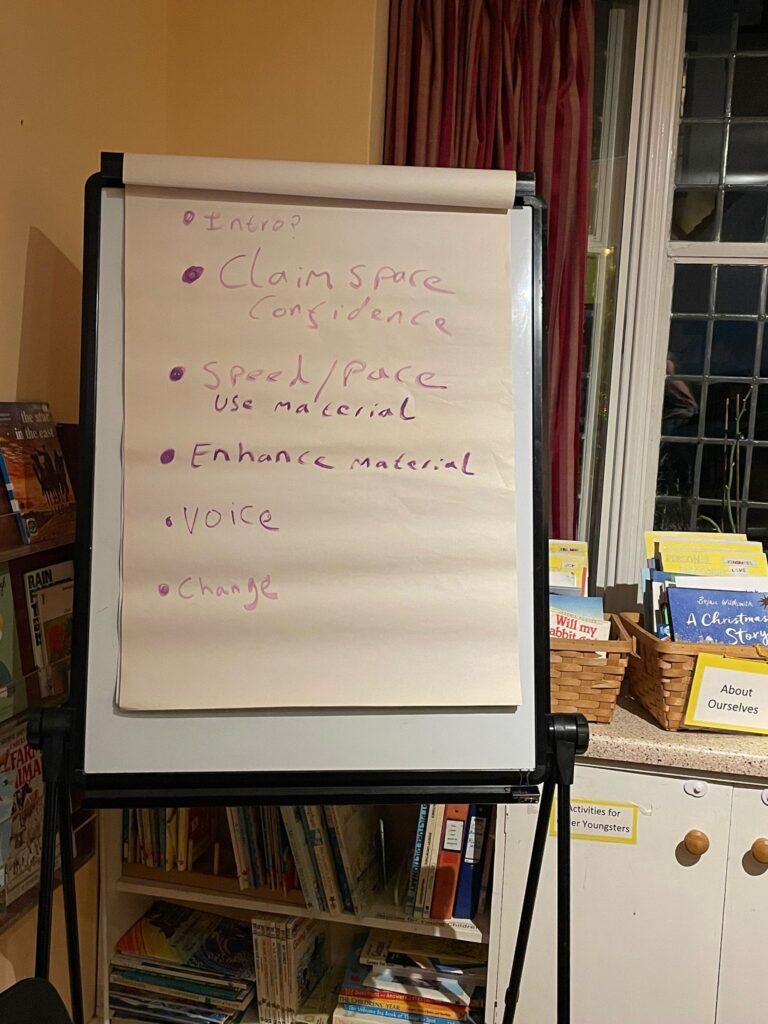Wednesday the 24th of January, The Quakers Meeting House. 7.00- 8.30pm
Our first workshop of 2024… and also our first event since gaining arts council funding! – I’m pleased to say that ‘Pimp Your Performance was a hit! – We were almost at maximum capacity with nine wonderful attendees. Thanks again for the friends meeting house for supporting MixMatched!

We began our workshop by pairing participants up, and asking them to share what had brought them to the workshop and something memorable about a theatre performance they’d recently seen, we then discussed this as a group, with some hilarious recounts of performances gone wrong!
We, the instructors, then gave a short introduction to what it means to ‘claim space’, and particularly to what it means to claim space as a Neurodivergent+ Performer. We covered the performance artists:
- Daniel Oliver – Dyspraxic Performance Artist – Theorizes how Awkward should be reclaimed as a more positive word for Neurodivergent+ Performers. That it is an inherent flavor that asks questions about the society in which we are in. He believes that ND creatives working with other ND creatives provides naturally wonderful awkward performance spaces.
- Jess Thom (ND performer/Tourette’s Syndrome) Founder of Tourette’s Hero, her performance of Samuel Becket’s ‘Not I’ toured Europe, her ‘Tic Language’ mixed with the play script, making each performance different. A BSL interpreter was incorporated into the play and translated both Jess’s Tics and the playtext. She talks about how people on stage with her have to be adapted, and improvisational by nature as she “pathologically can’t stick to the script!” Her tics are part of her/her performances, and, by being a visible disabled/ND+ artist, she has challenged existing binaries and expanded ND+ performance/how ND+ performance can be created and self-actualized.
- Sarah Saeed (Autistic Performer) An Autistic Performer who runs Lava Elastic ND Performance night in Brighton. She believes that ‘masking’/the art and nuance of masking have aided her in being able to adorn differing performance persona’s and impressions. She believes that as a ND performer, part of joy of the stage is exploring her masks – which one will she use/combine? – Will she experiment with unmasking on stage? – she sees ‘masking’ as something with huge creative and explorative potential.
- Victoria Melody (Autistic sociologist and Performer) – similarly to Sarah Saeed, Victoria Melody believes the act of masking has aided her performance practice. As a sociologist, she studies small unusual communities, and then uses this research within her stage shows. – She attributes some of her her ‘people watching’ and absorbing interest and skill to growing up ND, and needing to mask. Though she acknowledges that needing to mask may not have been ideal, she now uses some of the skill she has at masking to aid her performance.
With the above in mind, Emma Robdale gave a talk upon how, though everyone is able to enhance and work on elements of their performance, it’s doesn’t need to be about changing yourself to become more acceptable on stage, it can be about learning about what you feel comfortable with, which might also expand upon ND performance space. It isn’t just about ND people being ‘more accepted’, it is about them being able to take-control and challenge existing expectations.
Neurodivergent shape and space is a developing field. – It has the potential to develop more freely when ND creatives feel safe/comfortable in spaces, alongside other ND individuals, where they can ‘experinvent’ and harness a stronger seance of self and community.

After the break the room was drastically rearranged… There was now a stage space and an audience, and it was time the brave participants, who’d brought material to perform! – Four individuals took to the stage, three comedians and a poet. Their material and performance was then given feedback by the group, alongside drama therapist Holly, and Drama Lecturer, Emma Robdale. Ritch discussions, full of praise alongside constructive criticism, unfolded – hopefully enabling participants to learn from one-another and ‘pimp their performance’.
A few notes were taken on the board that applied to improve a number of performance, these were:
- Intro – Decide whether or not to introduce your piece – this can change the flavor of the performance – do you want to dive ‘straight in’ and engage straight with the audience, or would your act benefit from being framed?
- Claim Space/Confidence: The space is yours! – You have decided to be on stage, if you are able, you might as well make the most of it. It doesn’t always need to be about what the audience think of you, you have decided that you want to perform your act to them – so, try and make yourself comfortable and GIVE IT YOUR BEST SHOT! Even if people don’t fully ‘get’ or enjoy your piece, it will always be improved by you claiming the space. – and, ultimately, if you are able to enjoy the space/performing, then you are more likely to come away having had a good night – WHICH IS ALL THAT REALLY MATTERS! (Pluss you can always build more upon an act afterwards, half the battle is just being able to bring whatever you’ve got and be like “FUCK IT – I’m doing this!”
- Speed/Pace and making the most out of material – Due to the natural anxiety of being on stage, many people tend to speed up, and this can mean the audience finds it more difficult to understand. Especially in comedy, jokes need time to peculate, not only by pauses, but they can often also benefit from being expanded upon/drawn out longer (get three laughs for the price of one!)
- Enhance Material: What could you do to enhance the material? – Could it benefit from a prop? – could you go further into a character/voice? – Would audience interaction aid a part of your act? When you have an act, go through it and think how it could be made better – if you get feedback upon things people liked, how could you bring those out more/expand upon them? ( performance can be a malleable ever-changing art)
- Voice/Body Language Voice and body language are very imported, and often underestimated element of performance. They are one your most powerful tools. – after you have your material, it can be helpful to think about how/when to change and incorporated elements of movement/pitch/increased/decreased volume. What are the best ways to get the audience hanging on your every word?
- Change: An important compromise, you don’t want to be adding lots of ‘change’ into your performance for the sake of it (it can be distracting and off-putting) But, especially with poetry performances, where sometimes audiences can be ‘lulled’ and may loose focus, it can be helpful to incorporate small changes in your presentation. – even something as small as occasionally speaking a line directly to an audience member, eye-contact, or changing the rhythm of speaking can liven up readings.
Hope this write-up of our performance workshop has been helpful! – We have a workshop on every month… check our upcoming events to see what’s on! – and please comment if this was helpful 😀
